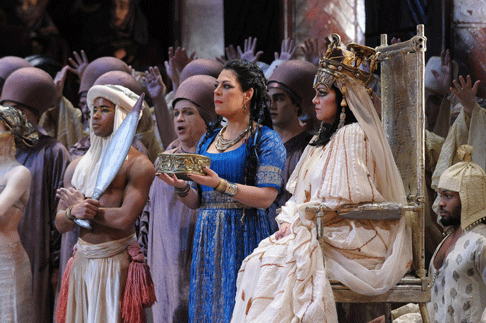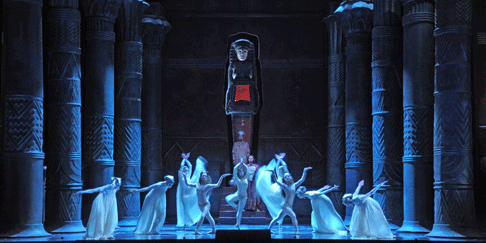Under the direction of conductor Renato
Palumbo the Ethiopian slave Aida is sung by Sondra Radvanovsky, Amneris by Jill
Grove, Radames by Marcello Giordani, Ramfis by Raymond Aceto, Amonasro by
Gordon Hawkins, and the King by Evan Boyer. At the start of the overture
Palumbo emphasized soft, legato playing among the strings with the
cellos standing out in gradual contrast. In the middle segment of the overture
familiar melodies associated later with specific characters and scenes were
etched out with clarity and crisp playing. A return to piano delicacy
rounded out the overture fittingly under Palumbo’s direction.
In Act One soon after the announcement by the priest Ramfis that direction
will be given to the Egyptian army the first scene of divided loyalties
features the officer Radames. Torn between his military ambitions and his love
for the slave Aida, Radames gives vent to his emotions in the celebrated aria,
“Celeste Aida.” Mr. Giordani sings here with an open, clarion
approach, the top notes taken forte and with full confidence. In
contrast, his final thoughts of the beloved are sung with an effective
diminuendo. Mr. Giordani’s conception of the role and the
complexities of character deepen as he proceeds into the following acts, so
that softer modulations evident later appropriately enhance the initial
impression given here. At the subsequent appearance of Amneris, daughter of the
Egyptian king, Ms. Grove struck a challenging figure by infusing an Italianate
sense of line with extremely effective low pitches. Her duet with Radames was
occasionally overshadowed by the orchestra, yet Ms. Grove’s thrilling and
secure top notes left her emotional ambitions for Radames clearly dominant.
At
the entrance of Aida the musical scene develops into a trio in which Ms.
Radvanovsky’s skillful piano singing suggested gradually
oppositional relationships. Such a conflict is intensified in the following two
scenes, first in the presence of the King and second in the temple of Vulcan.
When the King, sung with well-controlled declamation by Mr. Boyer, announces
Radames as the chosen leader to thwart the Ethiopian invasion, the soloists and
chorus declare their enthusiasm. In response to the choral cries of
“Ritorna vincitor!,” Aida sings her celebrated aria of the same
line with intersecting thoughts on homeland and love. Here Radvanovsky’s
middle range was especially well deployed with touching diminuendo and
a beautifully produced final note on “soffrir.” In the final scene
of this act located in the temple politics and religion focus again on the
forthcoming battles and prayers for the victory of Radames and his troops. The
choral exposition was here appropriately emphatic. As Ramfis the high priest
invested Radames with the ceremonial sword, both Aceto and Giordani expressed
their devotion with a noteworthy sense of legato.
 Sondra Radvanovsky as Aida and Jill Grove as Amneris
Sondra Radvanovsky as Aida and Jill Grove as Amneris
In the first scene of Act Two Amneris discovers indeed the secret of
Aida’s love for Radames. In their duet Grove and Radvanovsky were
dramatically convincing in their exciting duet “Fu la sorte.”
Grove’s powerful notes on “Trema!” after confirming the truth
expressed her determination to exact revenge. In response, Radvanovsky’s
touching pleas on “Numi, pieta” drifted into the air but remained
unheeded. As the outcome of the battles dominates the start of the next scene,
Ethiopian prisoners are brought in after a parade led by the victorious
Radames. A ballet conducted in honor of the King was especially well performed.
The vocal ensemble with, on one side, Aida and her father Amonasro as an
Ethiopian prisoner, on the other, Amneris, the King, and Radames was well
staged and seamlessly conducted. The act ended with Grove’s triumphant
declarations in response to the King giving her hand in marriage to Radames.
The single scene of Act Three of Aida on the banks of the Nile has
often been emphasized for its dramatic and vocal significance. In this
production the realistic atmosphere in the scene was introduced by a boat
seeming to glide along the river. After Ramfis utters a prayer for Amneris and
her marriage in the temple, Aida sings her romanza, “O patria
mia,” surely a highlight of these performances. Radvanovsky assumes a
bel canto line in her approach to the aria with exquisite high notes
taken on “mai piu” and at its conclusion. In the following duet
with her father Amonasro (“Ciel, mio padre”) both Radvanovsky and
Hawkins show strong emotional commitment communicated through vocal line and
use of rubato. During her impassioned exchange with Radames, Aida
finally convinces her lover to flee (“Fuggiam”). The floating
piano notes at the end of the duet belie the violent ending of the act
when Radames is taken prisoner after the accusation of Amneris.
 Scene from Aida
Scene from Aida
The final act of Aida places Radames in both scenes with the two
women vying for his affections strategically divided. At first Amneris attempts
to regain control by convincing Radames that she agrees to his defense before
the judges. Grove’s transition from hushed notes to a dramatic top gives
the impression of unhinged emotions. This heightened tension is enhanced during
her duet with Radames. Once he refuses the intervention of Amneris, he also
abandons himself to the tribunal. In response to his sentence of death Grove
hurls a final dramatic curse at the judges with blood-chilling fury. In the
final scene of Act Four Aida joins her beloved in the tomb to die at his side.
Radvanovsky and Giordani sang their final duet, “O terra, addio,”
with a renewed freshness as though their love formed a bridge to another world.
As they sang their final notes in piano unison, Grove’s chants
of “Pace” put a seal on their earthly life.
Salvatore Calomino
image=http://www.operatoday.com/Aida_Chicago_22.gif
image_description=Sondra Radvanovsky as Aida and Marcello Giordani as Radames [Photo: Dan Rest/Lyric Opera of Chicago]
product=yes
product_title=Giuseppe Verdi: Aida
product_by=Cick here for cast and other information
product_id=Above: Sondra Radvanovsky as Aida and Marcello Giordani as Radames
Photos: Dan Rest/Lyric Opera of Chicago